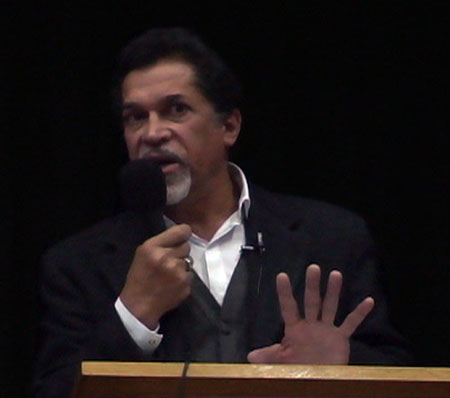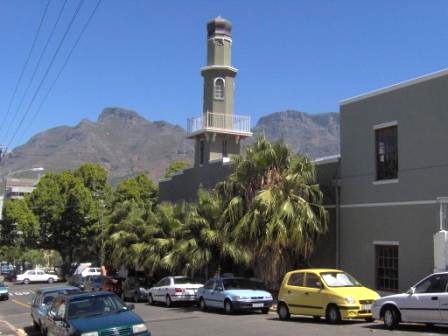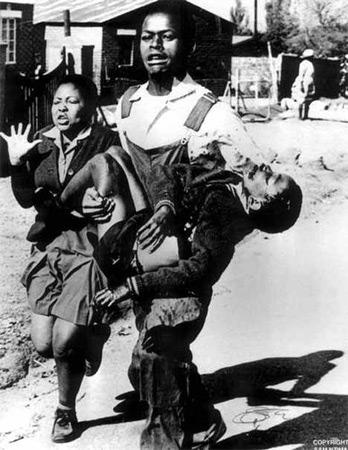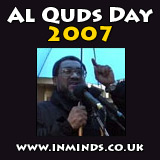|
[Other] Imam Achmad Cassiem - A Talk To Students
inminds.co.uk
17 November 2007  Imam Achmad Cassiem
"There are only two groups of human beings
who are of any importance to mankind,
and that is students and teachers"
Imam Achmad Cassiem, a teacher by profession, talked to 14 year old students in London in November 2007.
Imam Achmad Cassiem is the National Chairperson of the Islamic Unity Convention (South Africa). At aged 15 he joined the armed struggle against the oppressive apartheid regime in South Africa and at the age of 17 he was one of the youngest people to be imprisoned on Robben Island. He spent a total 11 years in prison and another 11 years under banning orders (similar to control orders).
He talked of the role of Muslims in South Africa's history of resistance, including education:
When the British arrived there [South Africa] in 1804, one of the first things they found there was this Masjid-al-Auwal , auwal in Arabic means the first, and it is still standing there in Dorp Street in Cape Town. They also found at that same Masjid, in 1804, 400 slave children and children of what they called freed blacks - those who has been freed from slavery, being educated in that Masjid. As far as I know, that is the first formal school to be established for slaves and for their descendants.
 Masjid al Awwal (Owal) in Cape Town, it included the the first formal school to
be established for slaves and their descendants. He talked of the Islamic concept of teacher:
Who is a teacher from the perspective of Islam? A teacher is first and for most, and therefore all students will follow the same criteria, a teacher is first and for most a sincere seeker of the truth, secondly a teacher is a sincere disseminater, a sincere spreader of the truth, thirdly a teacher is an exemplar - he or she sets the example.
All teachers are also agents of social change, and for social change, because if they are not then it means they are satisfied with the status quo - they are satisfied with things as they are. Now how on earth can the same people then promise their students that they will teach them how to attain Jannah [heaven] and avoid Jaanum [hell]. So the dunnya [this life] is the cultivating ground of the akira [the hereafter], and it is here that we have to decide what type of human being we want to be..
He shared glimpses of his experience in teaching in the townships:
 Soweto Uprising 16 June 1976, when over 500 people were
shot dead by the security forces of the apartheid state
as African school children protested over the imposition
of Afrikaans as a medium of instruction in township
schools. One of the first to be killed was 12 year old
school boy Hector Pieterson (shown above).
When I started teaching in the townships of South Africa,they are very rough places, the classroom I entered in 1977 after the uprising in June 16 in Soweto, 360 odd windows were broken, there were no knobs on the doors, the classrooms were filthy, there was no library - there was one dictionary in the whole school for a thousand students, some of the teachers were drunk, so it was chaotic. So I went in to my class and I bent down and picked up all the drink bottles and paper crisp packets and put it in the dirt bin, and then I greeted the class and asked them to sit down, and then I started my lesson.
I asked them what they were doing at the school, and they thought I was joking by asking them that. So i said if you are ill where do they take you? To the hospital or clinic. If your car breaks down where to you take it? They said to a mechanic. So I said now what are you doing here? What is this place? Its a school, its a place for learning and teaching. The next question was for the teachers - what it the primary purpose of education? And I got a hundred and one different answers, which meant that the teachers, the 53 teachers themselves did not know the primary purpose because each one was giving a different answer. Eventually we had to agree that the primary purpose of education in Islam is to teach human beings how to live with other human beings - that's the primary purpose. Rasoolallah says "my mission is to perfect human morality"..
He talked of the right to education, and in general the concept of rights in Islam:
[In Islam] for every right that you have, you also have an obligation. You have a right to education, but once you are educated you are under an obligation to educate others whether you get payed or not. You have a right to self-defense, one you are capable of defending yourself, then you must defend the defenseless.. and I'm thinking of our brothers and sisters all over the world, especially occupied Palestine.. its dishonest of us to say we belong to the same Ummah, and we are not concerned about what is happening to our brothers and sisters in all parts of the world. A hadith translates that one who wakes up in the morning without expressing concern for the affairs of Muslims, that person is not one of us, in other words he's not a Muslim.
He finished with the following words:
The trouble is when you put a mic in my hand, and you do not take it out of my hand, then I don't stop. And there is a very simple reason for that - that I spent 11 years in prison, where i was not allowed to say what I wanted to say. And I had 11 years of banning order which even told me I was not allowed to teach anybody except my own children, so Its just out of shear habit the lesson ends when it ends!
His talk was followed by a short question answer session. Full video and mp3 audio of his talk and qa session is provided below. An indepth interview with Imam Achmad Cassiem is available here.
Source: www.inminds.co.uk
Also Of Interest
Page URL: http://inminds.co.uk/article.php?id=10216
|




















































